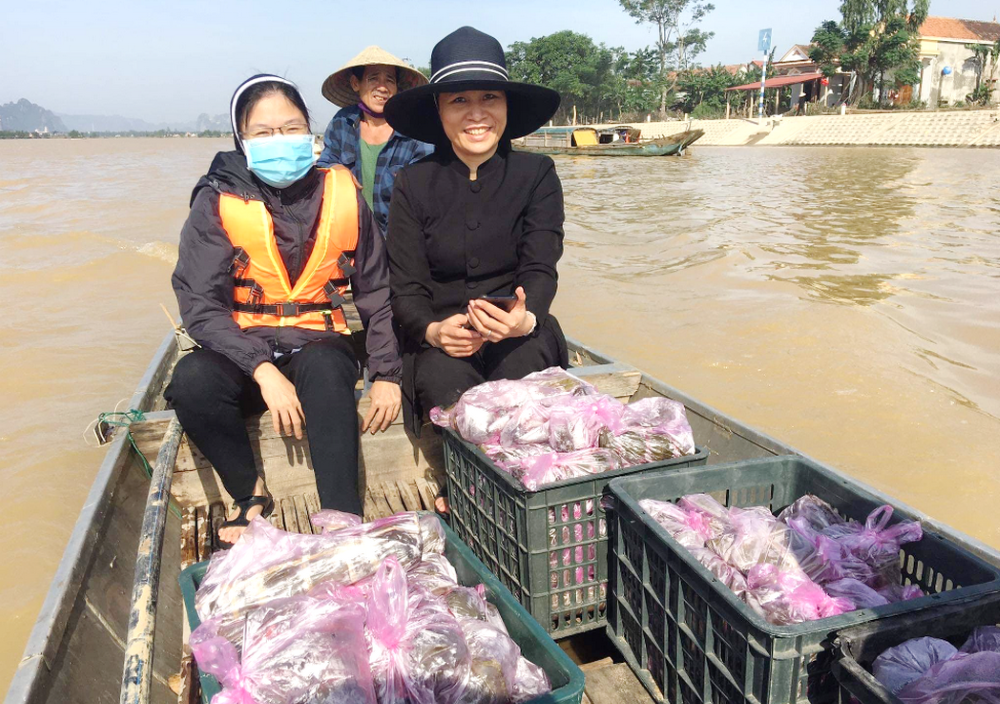
Srs. Anna Nguyen Thi Hong (left) and Anna Nguyen Thi Bich Nguyet travel by boat to give food to flood victims in areas of Vietnam in November. Sisters are helping people there ways to farm and make a living in an area prone to natural disasters. (Joachim Pham)
Editor's note: Global Sisters Report, the dynamic online community that reports on and gives voice to Catholic women religious around the world, is celebrating its 10th anniversary this year. Join us as we take another look at stories and columns published in 2014 with new updates and reporting.

Every day, Dang Phuc and his family members water and weed green vegetable beds in his 2,000-square-meter farmland.
They make organic fertilizer from garbage, straw and manure to grow radishes, spinach, pennywort and other vegetables; selling these products for their main income, Phuc said, they can earn 40 million dong (about $1,600) per year, even more than from growing rice.
"We are delighted to make our farmland viable for growing food to eat and to sell to others. Our farmland has yielded its harvests again," he said.
But in previous years they failed to cultivate rice, their main crop, in their field, which was heavily contaminated with alum from floodwaters in 2020.
Phuc, a father of three from Quang Dien district of Thua Thien Hue province, said Catholic workers including nuns encouraged him and other local people to compost and grow vegetables, rather than rice, as a way to adapt to climate change.
Sisters are also helping the community find ways to make a living in this province prone to natural disasters. With nearly 80 miles of coastline and a landscape including 90 acres of lagoons, Thua Thien Hue is one of most disaster-torn provinces in central Vietnam. It suffers from extreme weather conditions, such as the seven tropical storms in 2020 that claimed 41 lives and left 11 missing; and destroyed crops, buildings and other facilities. The storms caused total losses of 2,273 billion dong ($91 million).
Hoang Phuc Lam, deputy director of the National Center for Hydrometeorological Forecasting, said in a December television interview that the frequency and intensity of natural disasters in Vietnam are increasing, leading to more deaths and property damage. And the Disaster and Dyke Management Authority reported that in 2023 alone, the country suffered from over 1,100 natural disasters — including droughts, strong wind, flooding and landslides. The disasters left 169 dead or missing, injured 126, destroyed 52,000 houses and damaged 55,000 hectares (136,000 acres) of crops. Losses totaled 8,679 billion dong ($347 million).
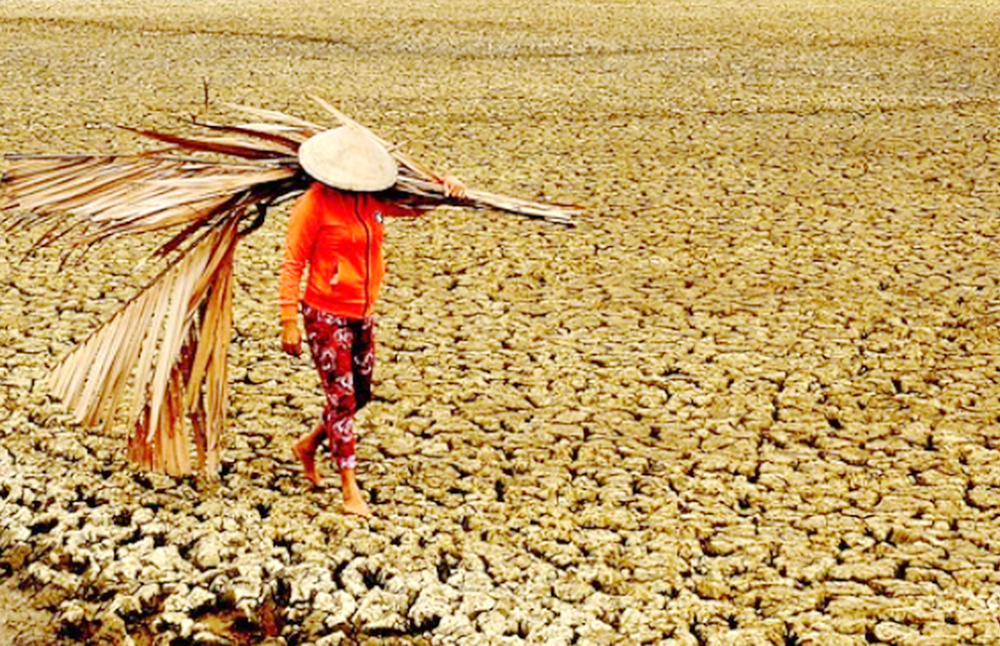
A woman walks through a drought-affected field in Nam Dong district of Thua Thien Hue province, Vietnam, in August. The province has been hit by many destructive weather disasters in recent years. (Joachim Pham)
Climate-resilient living
Sr. Anna Nguyen Thi Bich Nguyet, head of the Catholic Group for Climate Change Prevention, said "our first priority is to give vulnerable communities various options of climate-resilient living so that they can secure stable incomes in their home places instead of leaving for other places."
The group was founded in 2013 by the Daughters of Mary of Immaculate Conception and Daughters of Our Lady of the Visitation, with the aim of helping local people adapt to climate change.
"We annually offer financial assistance to some 150 households to raise fish and cattle and grow crops that are suitable for adverse weather conditions," Nguyet said. Many households are on the brink of ruin after floods, she said.
Phuc said some 100 households in his commune grow vegetables to put food on the table. In the past many had to look for manual jobs in other places.
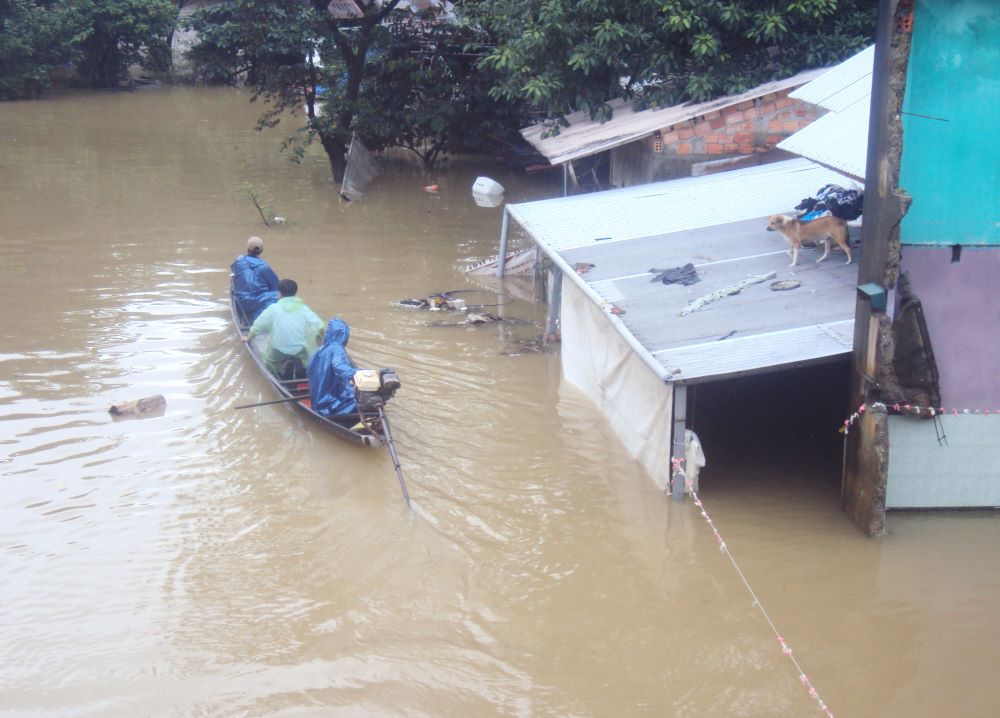
People travel by boat through floodwater in Quang Dien district of Thua Thien Hue province, Vietnam, Nov. 17. Some people cannot cultivate rice in their fields, which were heavily contaminated with alum from floodwaters. (Joachim Pham)
The 58-year-old farmer said he no longer rides a motorbike taxi to earn more income but dedicates himself to working in his rice field.
"Our projects aim to improve people's lives and educate them to adapt to climate change, recognize its impacts, respect the environment, [and] help one another survive natural disasters," said Nguyet, of the Lovers of the Holy Cross of Hue.
For example, oranges, tangerines, grapefruit and other indigenous plants cannot survive in severe droughts and floods, she said. Local people are encouraged to plant species resistant to drought to prevent soil erosion caused by blustery hot winds from neighboring Laos.
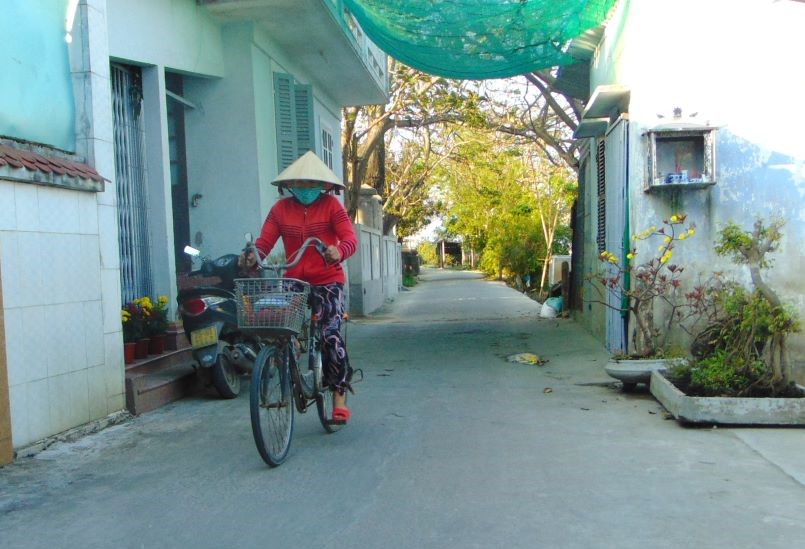
A woman rides her bicycle on a cement road on March 24 in Huong Tra district of Thua Thien Hue province, Vietnam. The Catholic Group for Climate Change Prevention built 16 roads linking villages in the three districts of Huong Tra, Phong Dien and Nam Dong in 2023. (Joachim Pham)
Nguyet said they also assist local people to build concrete roads and houses, grow vegetables without chemicals, and use biogas for cooking.
In 2023, the group built eight houses for people and 16 roads linking villages in the three districts of Huong Tra, Phong Dien and Nam Dong.
Daughters of Our Lady of the Visitation Sr. Anna Nguyen Thi Hong, deputy of the group, said they also educate about environmental stewardship among Pako ethnic villagers by encouraging them to reduce firewood for cooking and not let their animals roam outside freely.
Hong said ethnic villagers habitually cut trees for firewood, eroding their land, and that the environment is polluted by pigs roaming their villages. Group members give financial aid to 35 local households from Nam Dong district to build pigpens and produce biogas for domestic fuel needs. They also use wastewater from biogas tanks to fertilize their crops.
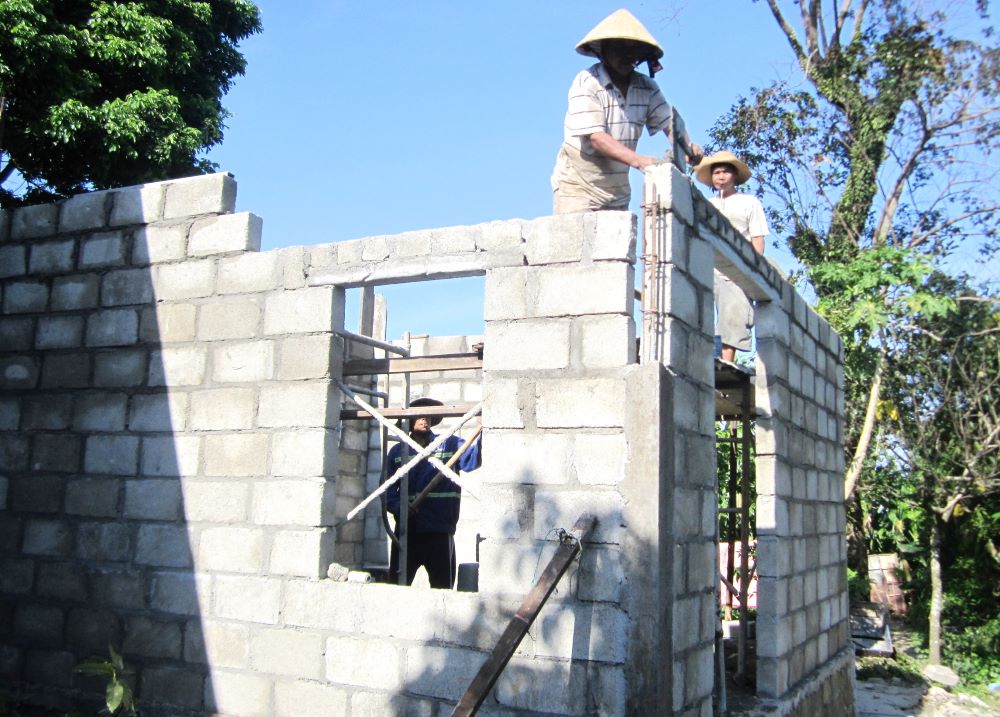
A house is under construction for a family in Phong Dien district of Thua Thien Hue province, on March 28. The house is sponsored by the Catholic Group for Climate Change Prevention, which built eight dwellings in 2023. (Joachim Pham)
Pako ethnic Ho Tuan, who was given 10 million dong (about $400) to raise pigs, said he saves a million dong per month on fuel and fertilizers.
"We no longer cut trees for firewood, but we try to plant many trees in our garden and farm as a way to care for the environment," said the 46-year-old farmer. He earned 50 million dong (almost $2,000) from raising pigs last year.
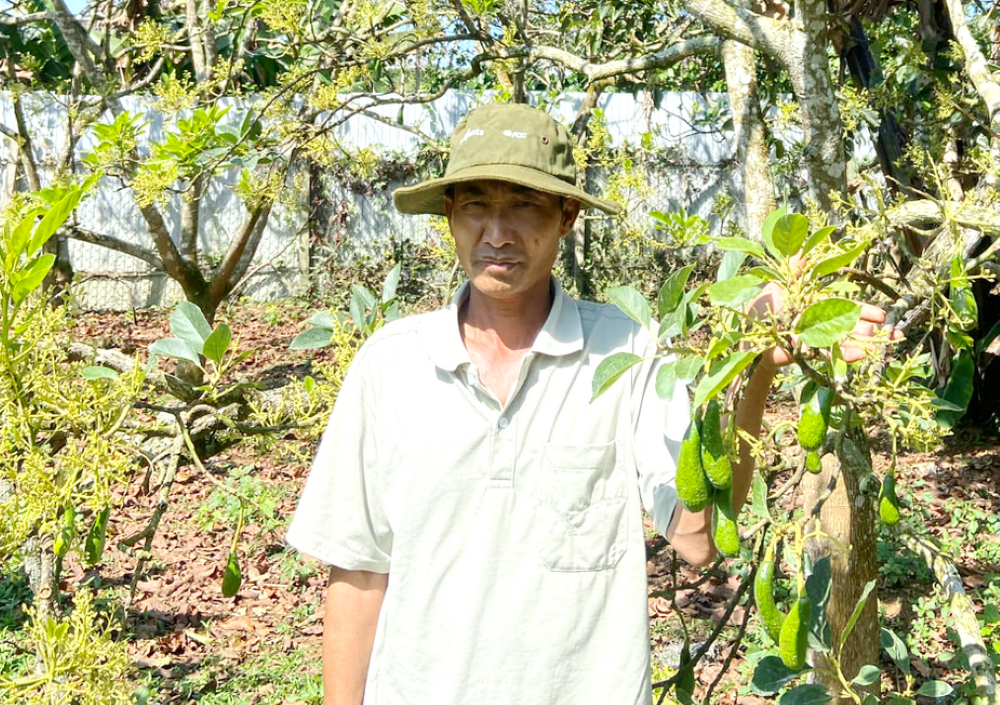
Le Van Dong from Cam Lo district, Quang Tri province in Vietnam, looks after avocado trees in his field in February. He received 5 million dong (about $200) in 2020 to plant 36 avocado siblings on his farm. (Joachim Pham)
Le Van Dong from Cam Lo district of the neighboring province of Quang Tri said he was given 5 million dong in 2020 to plant 36 avocado siblings on his 2,000-square-meter (6,561 feet) farm. Another 50 local households, who the group assisted, have also grown avocado trees and other crops for a living, he said
"We had a good harvest of avocados last year and earned 28 million dong ($1,120), which we never dreamed of," said the 61-year-old farmer who has four children and four grandchildren.
Dong said their 100 10-year-old rubber trees fell during a storm in 2020, which led to their financial ruin.
The group founded in 2013 has 20 members: five nuns from three congregations and 15 lay volunteers. They are trained in basic knowledge of climate change and how to support vulnerable communities.
Advertisement
Nguyet, 43, said they set up four teams of rescue volunteers (15 lay people each) at four parishes in Duong Son, Kim Doi, Quang Cong and Quang Phuoc, located in coastal lowland ecosystems. When storms and floods strike, rescue volunteers evacuate people to safe places and provide first aid to the injured.
Group members also educate people on global warming and the environmental benefits of planting trees, saving power and water, and reducing use of plastic bags.
Nguyet said the costs of their climate change projects are sponsored for three years by Misereor, a German Catholic bishops' development organization, through 2024. They're currently looking for benefactors "to cover our projects that enable local people to better understand climate threats, assess their vulnerability and seek ways to lessen the impacts of climate change," she said.
"Climate change is a burning issue that impacts every one of us, so we must all put in a great deal of effort into reducing this global threat."




